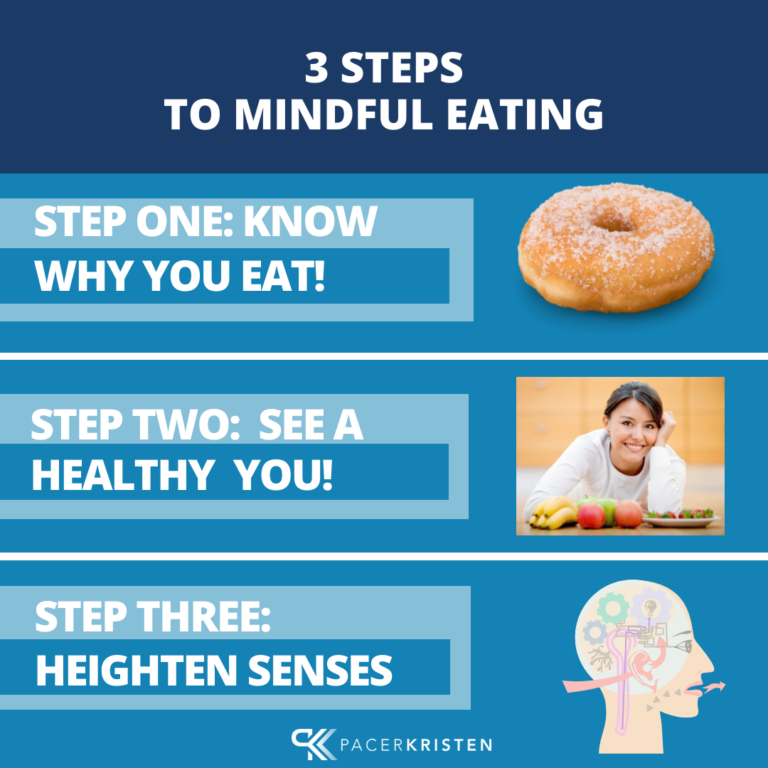CALM YOUR MIND, TRANSFORM YOUR HEALTH AND HAPPINESS

By Kristen Tinker
The Search for Pleasure… It’s like the Holy Grail!
We have long been obsessed as a people to seek out pleasure everyday. We seek pleasure and avoid pain…always have, always will. But, the quest for pleasure has reached new levels in the last few decades as we emotionally and mindlessly indulge in all things good, even at the cost of long term consequences.
Immediate mindless pleasure drives our modern, daily actions. Entire businesses were built around this very principle (think Starbucks…it’s instant pleasure in a cup!)
WE EAT HOW WE LIVE, and WE LIVE HOW WE EAT
Overfilled plates, foods that don’t nourish, multitasked eating, and fast food options dominate our lives. Being a busy Mom of 3, I routinely find myself also getting caught up in the craze.
The "too much" paradigm is a total reflection of lives that are too full, too fast-paced, spending too much money, unfulfilling relationships, and generally not focused in the moment. But life and eating don't have to be mindlessly chaotic and silently sabotaging your health.
WHAT IS MINDFULNESS?
The Mindfulness movement was largely popularized through Jon Kabat-Zinn’s Mindfulness-Based Stress Reduction program (MBSR), developed at the University of Massachusetts Medical School in 1979. Rooted in Buddhist traditions of spiritual enlightenment and focused on minimal suffering, mindfulness has become largely popularized in Western cultures as a way of decreasing psychological, physical, or emotional conditions…the big ball of stress!
And now with the new study of epigenetics we have even more reason to become more mindful, realizing we have the ability to turn on and off positive or negative gene expression as a result of our emotions and behavior. Mindfulness, not medication, to improve health? Yes, it’s true!
MINDFULNESS CAN DICTATE GENE BEHAVIOR
The practice of mindfulness applies to our eating and how we think about nourishing our bodies just as equally as it does to calming the mind and driving our health by influencing genes to “behave.” A calm mind both selects higher quality foods and subsequently exerts powerful influence on our genes.
Two mindfulness studies, including one led by Dr. Dean Ornish and colleagues at the University of California showed that a group of cancer survivors were able to molecularly mitigate and silence the processes playing a role in cancer through an hour-long meditative practice of breathing. Mindfulness to combat cancer.
It’s proof positive that mindful living, nourishment, and the health of our genes actually go hand in hand.
When you practice mindfulness, you calm your mind, you practice self-respect, you become fully present with all of your senses, and you use feelings of hunger and fullness to drive when, how, and what you eat. As a result, your overall wellness improves as you become healthier with better choices and with subsequently influencing how your genes behave.
The shift to mindfulness really boils down to just a few tweaks in your day, starting with plugging into your thoughts and realizing how you perceive yourself with heightened awareness around mealtimes. Yes, it’s that easy.

STEP ONE: KNOW WHY YOU ARE EATING BY CHECKING IN WITH EMOTIONS
Have you ever wondered, “why am I even eating?”…Silly question in and of itself. But, this question is at the foundation of mindfulness. Stress and high emotions, an overfilled calendar, limited self-belief, and even fear of failure can drive eating behaviors. Emotional eating rules the day, and with high emotions and an overfilled calendar, it’s sometimes challenging to identify the true cause of cravings.
With a mindful eating practice, you learn to listen to your body and what it’s telling you. You learn to eat from a place of forgiveness, self-respect, and total acceptance, because it is anchored in how you see yourself and how you use food to treat yourself.
Case in point, my old daily mantra went something like this, “I need and deserve a Diet Coke!” Who was I fooling? My body most definitely didn’t need 12 ounces of caramel-colored man-made chemicals and acid! But, it fed my obsession to restrict food, calories, and pleasure, and to see the "right number" on a scale. It filled my belly with carbonation, prolonging the time I could go without food. And, equally important, it validated feelings of limited self-worth that I didn’t deserve to eat real food.
I treated my life with little respect by eating fake foods that consumed my cells with negative information and that inevitably drove my chronic hip pain and foggy thoughts.
ACTIONS:
- CREATE SPACE. Before eating, create space to breathe and to check in with your body. This allows you to identify emotional eating from true hunger. You can do this by drinking a glass of water, waiting 15 minutes, and then considering whether you are truly hungry. Deep belly breathing also allows you to check in with your body and to identify stress.
- MANAGE YOUR STRESS. Critical to your health, breathing can modulate stress, trigger the parasympathetic nervous system to rest, digest, and to burn fat! Make deep belly breathing a part of your day and watch your health improve as you learn to check in with and deal with emotions.
- BE INTENTIONAL. Plan your day to include moments which nourish your soul. Look at your food as you are choosing it and ask, “Does this food help me or hurt me? Does this food feed or fight disease?" Read the label’s ingredients and nutritional facts. Drive the extra 5 minutes to a local Farmer's Market. Take deliberate actions to feed positivity into your life and to eat from a place of self-respect.
- GET CURIOUS. Operate from a place of curiosity to increase self-growth, self-love, and affirmation by trying new foods. Visit your local Health Food Store or Farmer’s Market. Take a dance class. Try a new vegetable (has anyone heard of Monkfruit?) and research a recipe for its preparation. One new food each week annually equates to 52 new foods and 52 new recipes annually. Even if you only liked 1/2 of the recipes, that’s 26 new foods and recipes for the year, which is perfect since we're more inclined to overeat predictably, regular foods. With curiosity, you gain the benefit of mindful eating as you add more pleasure into your life and learn new things to love about yourself.
STEP TWO: BUILD YOUR HEALTHY IDENTITY
Mindful eating requires self-acceptance and that you perceive the person you aim to be…ultimately a healthy person! You don’t have to be already healthy to perceive yourself as a healthy person, you just need to begin seeing the possibility of healthfulness.
ACTIONS:
- QUIET THE NEGATIVE VOICE. Your position in life and how you perceive yourself is executed though our inner voice. Quiet that ugly, old voice. Forgive yourself for short-comings and imperfections, and start talking to yourself with the language of possibility (“I’m an amazing mom to three children!”…”I’m a healthy person!” …”I’m a great runner!” …”I’m a student engaging in a lifetime of wellness!”…”I’m perfectly imperfect!”). It’s not about who you were; it’s about believing what you can become!
- CELEBRATE THE SMALL VICTORIES. Perfection is the enemy of progress. Aim to be the person you choose to be (tip number 1) and take one small daily action towards that goal. Then celebrate your daily successes, which accumulate into big changes.
- PUT JUDGEMENT ASIDE. When we stop judging others, we practice more forgiveness for ourselves too. Recognize that your healthful journey is not perfect, only healthy and the less healthy indulgences or actions are done so without guilt.
- BE GRATEFUL. Take a moment each day to close your eyes and to think about the blessings in your life. Before eating, consider the individuals and their actions that brought your food to the table. Be grateful for their work and the journey your food has taken to arrive beautifully on your plate!
STEP THREE: HEIGHTEN YOUR SENSES
A heightened awareness before, during, and after you eat allows you consciously to eat from a place of true hunger. Here’s how:
- Before eating, you plug into hunger cues and make an active decision to eat.
- While you eat, you focus on how your food looks, tastes, feels in your mouth.
- After eating, you consider your energy and have no guilt.
A nonjudgmental approach to eating is your goal, and it allows you to change your relationship with food, which may lead to healthier behaviors overall.
With a mindful eating practice, you might initially find a slight weight gain as you drop food restrictions, adopt a mindset of food freedom, and eat from a place of empowerment, even with an occasional, guilt-free indulgence.
ACTIONS:
- LIVE IN THE MOMENT. Breath, meditate, and bring uniqueness to each moment. Before cooking, light a candle, put on soft music, put the phone and TV aside. As you eat, notice if you are becoming full and satiated. Recognize if the flavors, textures, and tastes are fulfilling. Keep a journal if needed to track cues leading to food or beverage indulgences or binges.
- USE A CHARMED LIFE LENS. We spend far too much time consumed with pain and the arduous relationships or stressful tasks in our day. Allowing pain to be the focus, is like watering weeds in the garden. The pain (and the weeds) will surely grow! Consider the good foods on your plate and the goodness in your life; if they aren’t “good,” then fix it! Observe small details around you...your child's soft skin, the colors in the trees, etc…
- ACT AS IF YOU HAD GUESTS. Move slowly. Put electronics aside for periods of time. Plate your food on something nice, sit down to eat, eat slowly, savoring each bite. Look at your food and focus on its flavor using small bites and by putting your fork down between each bite. When your senses are alive, you eat more mindfully!
Becoming a mindful eater takes practice. It’s like building a muscle; the more you do it, the stronger and better you become at knowing why you want to eat, thinking of yourself as a healthy person, and then using your heightened senses to eat and to respect your body.
Kristen Tinker, M.A.
Certified Integrative Nutrition Health Coach
Certified Functional Movement Systems
RRCA Certified Running Coach
pacerkristen.mykajabi.com
instagram.com/pacerkristen/
[email protected]
Optimize Your SELF to Impact the WORLD
----------
Join the EVO Collective and access to our Newsletter, LIVE Monthly Masters Calls, and the EVO Masters Library. For FREE.
We hate SPAM. We will never sell your information, for any reason.


